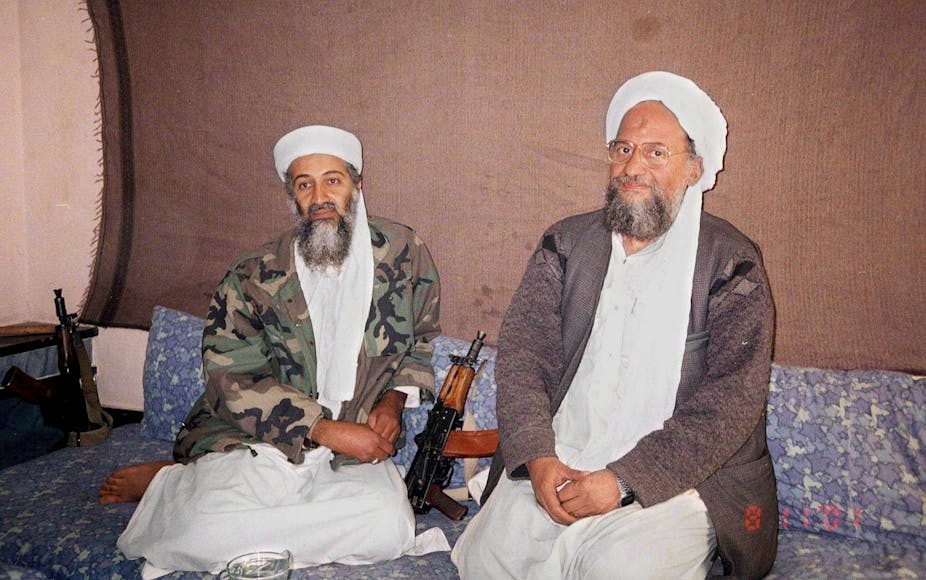The past few days have seen a flurry of prognostications on al-Qaeda and its future. While each argument spars over whether al-Qaeda is on the ropes or resurgent, they miss a vital segment of analysis. What are al-Qaeda’s grassroots supporters saying?
Unlike Western media, which has obsessively been writing about the anniversary, bin Laden’s supporters have not shown much initiative in remembering his legacy. In the days leading up to the anniversary of bin Laden’s “martyrdom,” there were a couple of threads on the forums that posted photoshopped pictures of bin Laden with al-Aqsa Mosque in Jerusalem behind him, adorned with flowers on the ground and an AK-47 on the side, along with other similar images. There was also a poem written in his honour.
It is still possible that online jihadis as well as supporters attached to al-Qaeda’s branches or individuals unaffiliated such as key ideologues could release commemorations, since most eulogies released last year for bin Laden were in the weeks after his death. Since then bin Laden has been highlighted in Dr. Ayman al-Zawahiri’s video message “Days With the Imam #1,” released last November. Bin Laden was also celebrated in Harakat al-Shabab al-Mujahidin’s message on the merger with al-Qaeda this February. In doing so, al-Shabab reiterated its fealty they gave to bin Laden would also hold true to al-Zawahiri. This hearkened back to al-Shabab’s original pledge of allegiance to bin Laden when they released a video in 2009 titled “Labayk ya Usama” (At Your Service Oh Usama).
Overall, though, one has not seen too much in the past year. There are two potential explanations: individuals still remember bin Laden, but have moved on, or they view celebrating his “martyrdom” as contrary to Islam. With regard to the first, this explanation would suggest that grassroots supporters are more focused on the here and now. They look to the new leaders like al-Zawahiri that have filled the vacuum. It may also indicate that the global jihad movement is larger than one individual and it is more about ideas than personalities. If one looks to ‘Abdullah ‘Azzam and Abu Mus‘ab al-Zarqawi, one sees adoration for both sporadically, but there is not a culture of sainthood. Nor did we see the twentieth anniversary of ‘Azzam’s death in 2009 or the fifth year anniversary of al-Zarqawi’s death in 2011 celebrated. As such, while bin Laden will always be remembered in the hearts of his supporters, he is but a human and not a deity.

The above dovetails with the likelier reason one has not seen an outpouring of celebration over the “martyrdom” of bin Laden. Recently, a leading global jihadi Shaykh Hani al-Siba’i, formerly of the Egyptian Islamic Jihad and currently the deputy leader of the Sunni Front for the Salvation of Egypt, publisheda new fatwa (jurisprudential ruling). The questioner asked al-Siba’i whether it was permissible to celebrate the memory of the “martyrdom” of bin Laden. In response, al-Siba’i explained that celebrating bin Laden’s death would un-Islamic. He considered it bid’a (an innovation). Al-Siba’i provided the proof that Muslims don’t even celebrate the prophet Muhammad’s birthday or death (within Salafi discourse this is the case, but does not hold true for all Muslims). This argument when understood in the context of the Salafi ideological milieu is a probable reason why one does not see large-scale commemorations from bin Laden’s hardcore supporters.
Therefore, while some in the West may take comfort in celebrating the one-year anniversary since bin Laden was killed, those that follow him closest have restrained themselves from sanctifying bin Laden. To do otherwise in their view would sully Islam, which is what they believe they are fighting for, whereby the only truth comes from God and not man. The West’s continued obsession with bin Laden speaks louder volumes about “us” than jihadis’ lack thereof.

